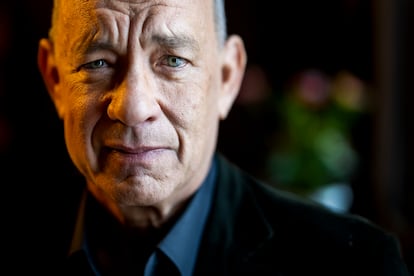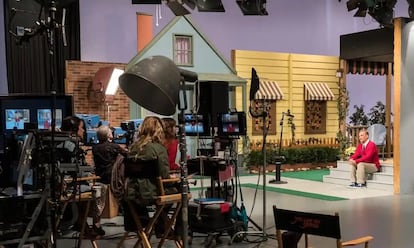Tom Hanks: Writer by trade
The actor’s recently published first novel, ‘The Making of Another Major Motion Picture Masterpiece,’ is a love letter to shooting movies, the camaraderie of film crews and a liberal, multiethnic United States


Tom Hanks is now an author. He has just written a novel, The Making of Another Major Motion Picture Masterpiece, which comes after a previous collection of short stories, Uncommon Type: Some Stories (2017). And what is the two-time Oscar winner going to talk about? Well, Hollywood, film shoots and the murky times the film industry is experiencing. And about the America in which Hanks seems to feel increasingly alone every day and, as such, becomes an aspiration that is far from reality: a multiethnic America that repays hard work and talent with promotions and decent salaries. The best that can be said about Hanks’s novel is that it oozes Hanks from every angle and that it is fluidly written. But that also weighs the book down: Hanks has not written a satire but believes in his work and, like a prestigious director, has retained control over the final editing.
Throughout his career, Hanks has been followed by the idea that he is a modern-day Jimmy Stewart, the notion that he is kind of corny and soft, though he has moments of assertiveness when it is called for. In person, he is a charming guy, who has come back from many things (including a bad case of Covid-19 that he and his wife, fellow actress Rita Wilson, contracted after filming Elvis in Australia); he also has a tremendous ability to laugh at himself.
Yet his spirit and novel resemble Norman Rockwell’s drawings of a blessed America: weathered and vilified, it has its dark side, but it’s essentially pure and timeless at heart. In The Making of Another Major Motion Picture Masterpiece, which is hard to get into because of its Russian doll-like structure, the United States becomes yet another character, a nation born of the Democrats’ best dreams, with its mix of ethnicities and commitment to gender equality, just rewards for one’s efforts, forgiveness from society’s wayward children who return home as good prodigal sons and daughters, and the triumph of quality films and actors (not just the ones with chiseled muscles). What Hanks sees as a beautiful place to live will seem like a pipe dream to others.
The Making of Another Major Motion Picture Masterpiece opens with a journalist explaining that he is the author of the work, and he immediately starts projecting Hanks’s thoughts into his words: “I don’t hate any films. Movies are too hard to make to warrant hatred. If a movie is not great, I just wait it out in my seat” and “journalists — the lazy ones anyway — always try to explain how movies are made, as though there’s a secret formula that we’ve patented, or procedures that are listed like a flight plan for a voyage to the moon and back [...]. If they saw how we movie-orphans do our job, they would be bored silly and very disappointed.”

From there, Hanks jumps to 1947 and the happy childhood of a boy in an exemplary family from Lone Butte, California — excessively similar to Concord, the author’s hometown, both places with a strong Hispanic influence. The boy receives a surprise visit from his maternal uncle, who is emotionally shattered, since witnessing and causing trauma in World War II.
Flash forward to 1971. That boy, now in his twenties and living in the middle of the Vietnam War, returns to his childhood comics of war exploits to draw a political-satirical comic. The result is brimming with the pain of his relative and the hell he suffered, starring Firefall, a flamethrower-operating soldier who jumps from conflict to conflict, supporting the American troops, without mercy for the enemy. And that work, The Legend of Firefall, will be the basis for a superhero movie directed by Bill Johnson — a fictionalized version of Steven Spielberg — who is a filmmaker so perfect that he is simultaneously — and without contradiction — an auteur and box-office powerhouse.
Hanks continues to project his musings. “Making movies is about solving more problems than you cause,” he notes. “I make movies because no other labor satisfies my quest to capture an unspoken truth,” the director blurts out in a motivational talk ahead of the 2020 filming of Knightshade: The Lathe of Firefall. At another point, the writer devotes lines and lines to describing typewriters (the actor collects them), weighing down the emotional progression of the plot.
Of course, there are bad guys in the novel, obnoxious star actors. However, The Making of Another Major Motion Picture Masterpiece is written a la Forrest Gump: the good guys are good, and the bad guys are bad; goodhearted wayward boys will reform and the kind, hard-working people will prosper. Good triumphs. Even if it is on a 53-day shoot for a Hollywood blockbuster in which a self-important star is fired two days into the movie.
In promoting the novel, Hanks confessed to the BBC: “Not everybody is at their best every single day on a motion picture set. I’ve had tough days trying to be a professional when my life has been falling apart in more ways than one and the requirement for me that day is to be funny, charming and loving — and it’s the last way I feel.” And on CBS Mornings, he revealed that some of the jokes, such as wearing sunglasses to lend truth to a character the star plays, came from his own experience blowing up a film shoot during those tough times.
The actor has been writing all his life and has authored several screenplays. He started this novel in 2018: “I wrote in between films, I wrote wherever I was, I wrote on planes, I wrote at home, I wrote on vacation, I wrote in hotel rooms, I wrote on long weekends when I wasn’t working.” The novel reads like a love letter to his Hollywood, to his United States, to that which Norman Rockwell might paint in 2023. But the reality, with actors on strikes, Q-Anon plotting and systemic racism still a problem, paint a different picture.
Sign up for our weekly newsletter to get more English-language news coverage from EL PAÍS USA Edition
Tu suscripción se está usando en otro dispositivo
¿Quieres añadir otro usuario a tu suscripción?
Si continúas leyendo en este dispositivo, no se podrá leer en el otro.
FlechaTu suscripción se está usando en otro dispositivo y solo puedes acceder a EL PAÍS desde un dispositivo a la vez.
Si quieres compartir tu cuenta, cambia tu suscripción a la modalidad Premium, así podrás añadir otro usuario. Cada uno accederá con su propia cuenta de email, lo que os permitirá personalizar vuestra experiencia en EL PAÍS.
¿Tienes una suscripción de empresa? Accede aquí para contratar más cuentas.
En el caso de no saber quién está usando tu cuenta, te recomendamos cambiar tu contraseña aquí.
Si decides continuar compartiendo tu cuenta, este mensaje se mostrará en tu dispositivo y en el de la otra persona que está usando tu cuenta de forma indefinida, afectando a tu experiencia de lectura. Puedes consultar aquí los términos y condiciones de la suscripción digital.








































